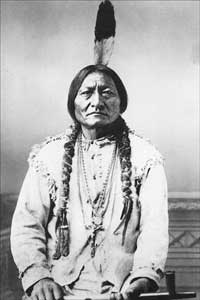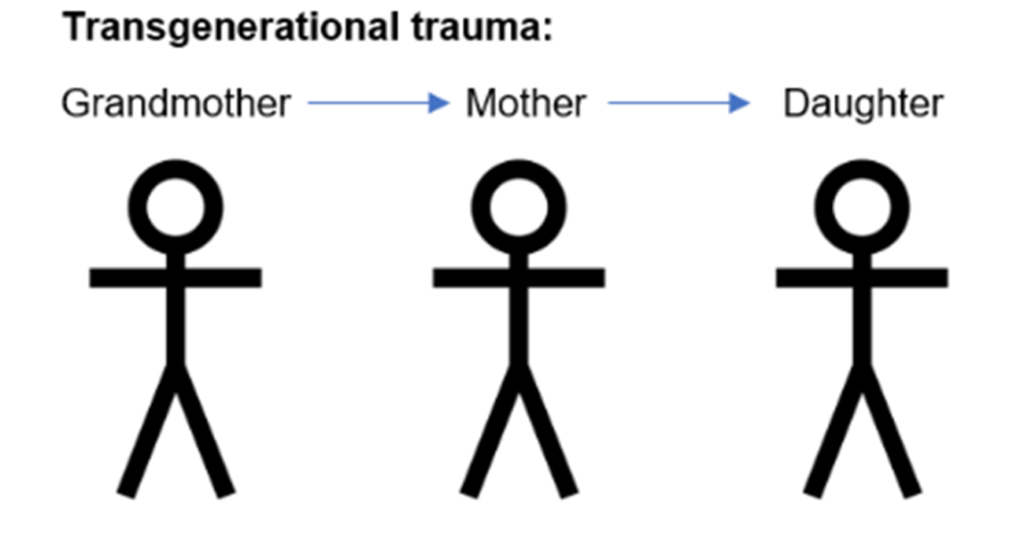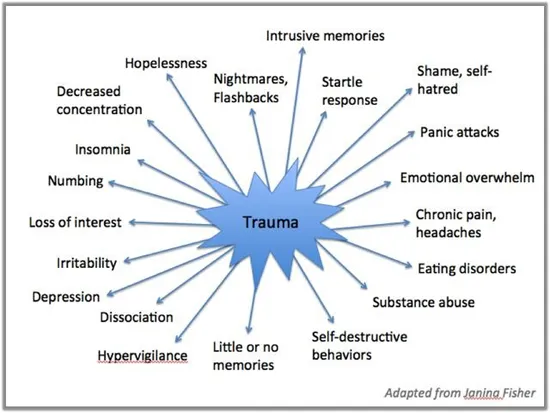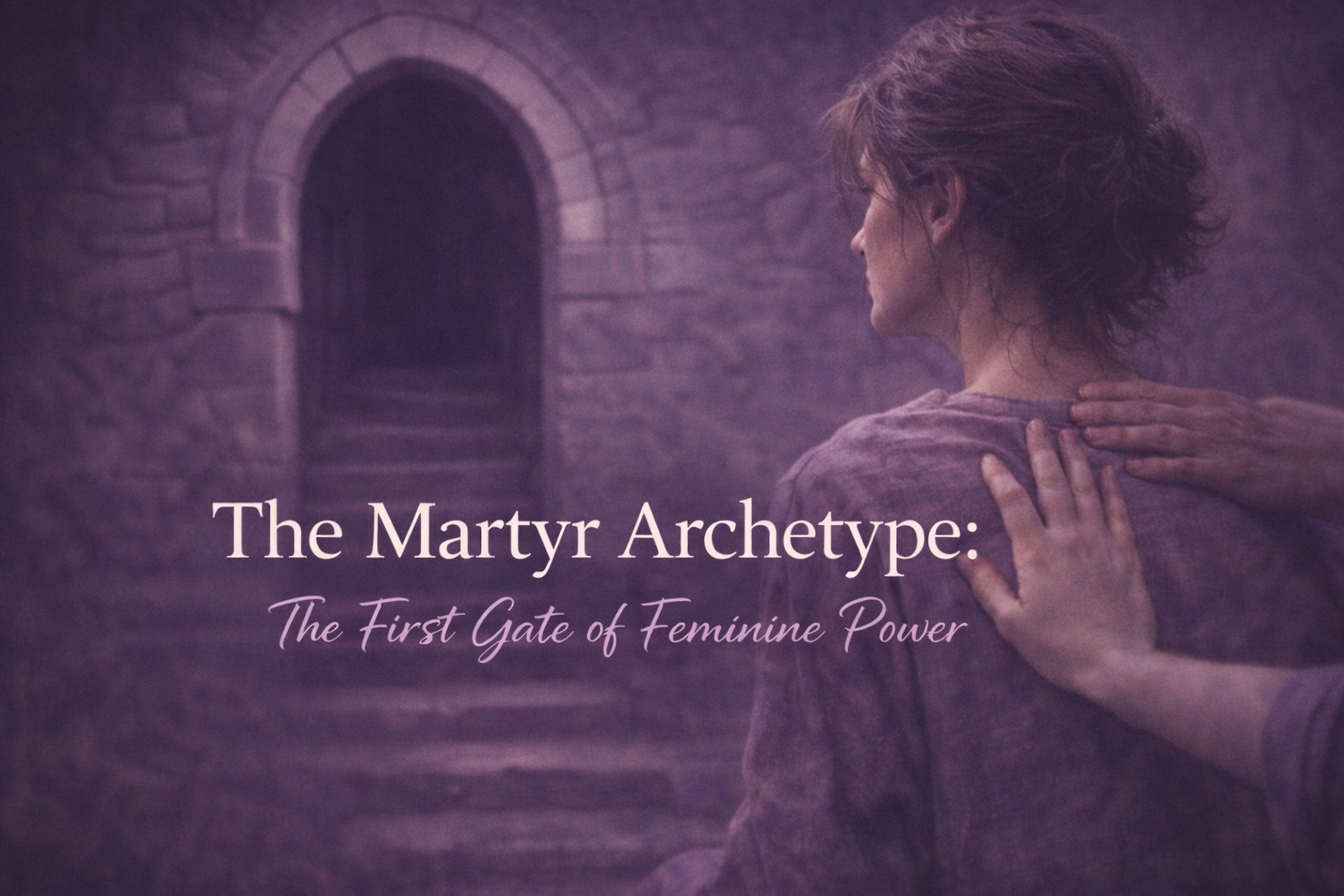“It’s up to us to break generational curses. When they say, ‘It runs in the family,’ you tell them, ‘This is where it runs out.’” ~Unknown
Breaking generational trauma is some of the most powerful healing work we can do. It has been said that when we do this work, we heal not just our wounds, but many generations.
Many times it is not just your own traumas that you are carrying but the unconscious effects of intergenerational trauma. Our bloodline and connection to our ancestors is not just some fairytale concept, they live, breathe and see through us and play a key role in our life’s trajectory.
If you want to really tap into your power and experience true breakthroughs that reverberate throughout your life, breaking generational trauma should be a priority.
The Lakota people have a historic concept that our healing extends seven generations in both directions. Modern science has demonstrated via the study of epigenetics that intergenerational emotional, mental, and spiritual trauma is passed on in addition to biological genes from parent to kid.

Storytime…
Despite her beauty, my mother experienced early heartbreak from love. Her view of men was shaped by this tragedy along with her negative early experiences with the man who was supposed to protect her in life, her father.
As a single mother raising two daughters and with wounded feminine energy, she leaned heavily into the feminist ideology.
The outlook that women could be the same if not better than men boded well with a woman that found herself disappointed by men and navigating life storms alone.
The truth however, is that her worldview was born of a series of misfortunate events which gave rise to a type of misandry masquerading as feminism. I unconsciously took stock of how toxic “strong women” acted.
The emotions were not seen as intuitive guides leading us deeper into self knowledge, they were considered weak. The constitution of my wider family’s trauma did not honour the essential nature of femininity.
This wounded feminine shadow was handed down from mother to daughter. The feminine energy in our family did not get a chance to experience the love and protection of healthy masculine energy and from this wounded place we attracted the men in our lives.
They were attracted to our unconscious wounds!
This is how intergenerational trauma is passed on. Trauma that is transmitted from a trauma survivor to their offspring is referred to as intergenerational trauma. Another name for it is multigenerational or transgenerational trauma.
Individuals who are suffering from intergenerational trauma may exhibit signs, feelings, behaviours, and psychological and emotional ramifications from trauma that occurred in earlier generations—not only their parents or grandparents.
Breaking generation trauma: Awareness of your patterns
Generational trauma is picked up and handed to our descendents through conscious and unconscious parenting choices. However your generational trauma will be coded in your dna because of the way that trauma epigenetically changes dna.

Traumas can affect one or more family members and are characterised by terrifying, violent, or sometimes life-threatening events. Traumas can induce traumatic stress reactions in family members, which can have a negative impact on relationships within the family and prevent the family from functioning at its best.
For instance the soft or subtle emotions in my family were an admission of weakness. Feelings were bottled, suppressed and only given an expression when they took the form of anger.
This disadvantageous start in life made me track mud from my childhood, into my early twenties when my dating life began. I was like nectar to unemotional, heartless, unhealthy and tocxic men. I was attractive to men with wounded masculinity whose heart was offline. They were able to exploit my own low opinion of femininity.
Healing came through learning how to connect with the true self.
Commiting to learning about your shadows and doing the necessary shadow work is how you tap into the unconscious wounds that can sometimes lead us astray. I personally found that working with plant medicine for a few years was a game changer.
Internalised unhealthy masculine energy
The females in our family worked out that there was less risk of vulnerability in anger. Wounded masculine energy suppresses the feminine principle from arising using traits such as control, anger and intimidation tactics. Anger was the tool of choice in our family as it gives individuals a false sense of feeling in control. However the sacrificial lamb for wounded masculine energy is the healthy feminine nature.
When we talk about toxic masculinity we commonly defer to overt expressions usually common in men. Rarely do we notice when feminine energy is embodying toxic masculine traits.
Breaking generational trauma to attract healthier partners
When it comes to attracting a partner breaking generational trauma is significant. Oftentimes you will find yourself attracted to partners that mirrors unhealthy qualities that lay within, oftentimes overlooking your own unconscious patterns.

Women who are embodying excessive ‘wounded’ masculine energy may find themselves unconsciously competing with their partner.
Let it be said that both males and females are each made up of feminine and masculine energies. Learning how to balance these energies within has far-reaching ramifications to determining what kind of partner we attract.
I found that in my own anecdotal experiences leading relationships with masculine energies was a trauma response from feeling unsafe in my feminine energy. I also unconsciously did not trust masculine leadership which was a healthy instinct when you consider that I had not learnt to heal the masculine energies within.
You attract what you are a vibrational match to after all. Balancing the polarities within goes a long way to breaking generational trauma and attracting a complementary partner.
Wounded feminine archetype
- She typically lacks confidence and seeks approval from others.
- She can be judgmental, and her loved ones may feel that they are never good enough since she is constantly finding fault
- She is a needy person in relationships; she begs and wants to feel appreciated.
- She lacks emotional self-control
- She frequently uses manipulation
- She has an obsessive, compulsive attachment to things and fears losing them.
- She overrelates and overshares her needs and feelings.
- She always seeks love because she is so in need of it.
- She perceives herself as a victim.
- She puts others before herself and makes sacrifices for them.
- She can come across as being false.
- She lacks self-control and limits because of an unhealthy internal masculinity.
Wounded masculine archetype
- He is competitive and always wants to win
- He is focused on goals and attached to success
- He tends to avoid connection and can be cold and distant
- He takes everything personally
- He needs to be right
- He fears failure
- He defends himself, attacks, accuses
- He sometimes runs away from love, withdraws, creates separation
- He can be aggressive
- He is critical and judgmental
- He is narcissistic and selfish
- He can’t really, deeply listen to others
- He is stuck in the mind
- He isn’t in touch with his emotions
- He can have addictions to work, drugs, tv etc.
- He has unhealthy internal feminine who is serious, rigid and controlling
Generational Trauma Examples
I can trace my recent maternal ancestors all the way down to myself and observe the ways generational trauma has affected the ways that I related to the opposite sex.

There have been multiple observational studies on how experiencing a famine prenatally affects offspring. The researchers found a consistent correlation between prenatal exposure to famine and adult body mass index (BMI), diabetes, and schizophrenia.
Another study in 2018 found that the male offspring of Civil War soldiers who spent time as prisoners of war (POWs) were more likely to die early after age 45 than people whose fathers had not been POWs. The researchers concluded that paternal stress could affect future generations and that the impact may occur through epigenetic channels.7
Nature vs Nurture
The Civil War study recognised that cultural, psychological, or economical factors may also have an impact on the transmission of trauma in addition to epigenetics.
Put differently, children whose parents have gone through trauma are more likely to have a parent who is unstable, emotionally unavailable, or worried as they grow up, and these kinds of parenting practices may also be a factor in trauma that is carried down to future generations.
Long-Term Repercussions
Trauma is recognised to have long-lasting effects on a person’s physical, mental, and emotional well-being. It would seem to reason that trauma would have an impact on the lives of future generations if it is transmissible epigenetically.8
The following are some possible long-term impacts of trauma:
- Dysregulation of emotions
- numbness or disassociation from memories, actions, and ideas
- disruptions to sleep
- problems related to substance usage
- Physical symptoms include those related to the digestive system, heart, brain, musculoskeletal system, respiratory system, and skin.
- Hypervigilance and hyperarousal
- obtrusive recollections and thoughts
- Recalls and triggers
- Depersonalisation, derealization, and disassociation
- Self-destruction
Final thoughts
Generational trauma healing is a crucial step in breaking the cycle of toxic masculinity in women. By addressing and healing the deep-rooted wounds passed down through generations, women can begin to reclaim their power and redefine their identities.
It is important to recognize that toxic masculinity not only affects men but also impacts women by perpetuating an unhealthy relationship with masculinity. Through generational trauma healing practices such as shadow work, mindfulness, and self-care, women can start to unravel the layers of conditioning that have shaped their experiences.
By acknowledging the impact of generational trauma of toxic masculinity in women, we can work towards creating a society where feminine and masculine energy finds healthy expression without judgment or repression. Healing begins with awareness and acceptance, paving the way for a brighter future where the divine masculine and feminine can unite.






2 Reflections
Share your reflection below... I’d love to hear how this transmission lands for you.
This reflection space is part of a living temple of dialogue, a place for insight, resonance, and respectful exchange. All comments are read with care and may be lovingly edited for clarity, formatting, or safety before publication. Please share from your heart, speak with kindness, and keep this space high in frequency. Promotional links, aggressive language, or off-topic content will be removed. Thank you for honoring the spirit of this sanctuary.